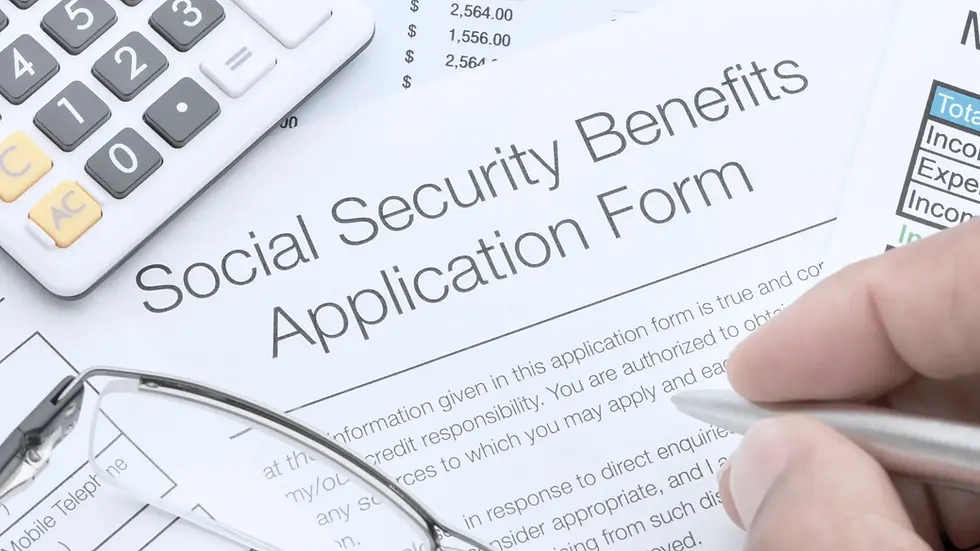What Happens If You Are Denied SSDI Benefits?
- ELF Legal

- Aug 27, 2025
- 7 min read
Updated: Feb 7

Receiving a denial letter for your Social Security Disability Insurance (SSDI) claim can feel devastating. When you're already struggling with a disability that prevents you from working, getting denied SSDI benefits adds financial stress to an already challenging situation. However, a denial doesn't mean your journey ends.
At The Edmonson Law Firm in Buford, Georgia, we understand the frustration and anxiety that comes with SSDI denials. As Georgia's Hometown Law Firm, we've helped many residents navigate this difficult process and get the benefits they deserve.
This guide will walk you through what happens after a denial and how you can move forward with confidence.
Skip Ahead:

Understanding Why SSDI Benefits Get Denied
The Social Security Administration (SSA) denies approximately 65% of initial SSDI applications. Understanding the common reasons behind these denials can help you prepare a stronger case moving forward.
1. Not Enough Medical Evidence
Most claims get denied because people don't have enough medical records. Social Security wants to see detailed proof of your disability and how it stops you from working. Many people don't realize how much paperwork they need, which leads to denied SSDI benefits.
Your medical evidence must show:
Detailed diagnosis of your condition
Treatment history and ongoing care
Functional limitations and restrictions
How your condition affects daily activities
2. Technical Errors and Incomplete Applications
Simple mistakes can derail your claim. Missing signatures, incomplete forms, or failure to provide requested documentation often result in automatic denials. The SSA's strict deadlines and complex paperwork requirements can make it easy for people to make mistakes.
3. Earning Too Much Income
If you're working and making too much money, Social Security will deny your claim. In 2024, you couldn’t earn more than $1,550 per month and still qualify for benefits. For 2025, the amount is $1,620 per month.
How To Appeal an SSDI Benefits Denial
If you're thinking "I’ve been denied SSDI benefits, now what??", don't panic. You can fight your denial through the appeals process. There are four possible steps in the appeals process, and each one has its own deadlines and rules.
1. Request for Reconsideration
You have 60 days after getting your denial letter to ask for reconsideration. This means a new person will look at your entire case from the beginning. They'll review all your old records plus any new medical papers you send.
Your chances of winning at this stage are low - only about 13 out of 100 people get approved. Regardless, you will have to complete this step before you can move on to the next one.
2. Administrative Law Judge (ALJ) Hearing
If your reconsideration request gets denied, the next step is requesting a hearing with an Administrative Law Judge (ALJ). This is where having experienced legal representation becomes crucial.
Judge hearings give you the best chance of winning. About half of all people get approved at this stage.
During these hearings, you can:
Present your case in person
Provide testimony about your limitations
Have medical experts testify on your behalf
Cross-examine vocational experts
Most clients of The Edmonson Law Firm get approved at this step.
3. Appeals Council Review
If you're denied SSDI benefits after hearing with the ALJ, you can request a review by the Appeals Council. They look over cases for legal mistakes or policy violations. Next, they may approve your claim, deny the request, or send the case back to the ALJ for another hearing.
4. Federal District Court
If you're denied SSDI benefits twice through the Appeals Council, your final option is filing a lawsuit in federal district court. This step requires expert legal experience and resources you may not even know about.
The Importance of Talking to a Highly Rated SSDI Lawyer
Navigating the SSDI appeals process alone significantly reduces your chances of success. Statistics show that represented claimants are three times more likely to win their cases compared to those who proceed without legal help.
Benefits of Professional Legal Assistance
Hiring an experienced SSDI lawyer helps you in several ways:
They Know What Evidence You Need: Experienced SSDI lawyers know exactly what paperwork Social Security wants and how to present it the right way. They can spot problems in your first application and fix them.
They get copied on all SSA correspondence: it is a good thing to make sure notices and other important documents are not missed due to issues with the post office delivering on time.
They Handle Court Hearings: Judge hearings are complicated with lots of legal rules and tough questions. An experienced lawyer can present your case and protect you during the whole process.
You Don't Pay Unless You Win: SSDI lawyers only get paid if you win your case. They take 25% of your back pay, but never more than $9,200.
When Should You Hire a Lawyer?
You can try to handle the initial application or first appeal on your own, but getting a lawyer becomes more important as your case moves forward. Many people wait until they're denied SSDI benefits after their ALJ hearing to get legal help, but hiring a lawyer earlier usually works out better.
Think about hiring a lawyer when:
You're just starting your SSDI claim and want help with the application
Your first claim gets denied
You have a complicated medical condition
You don't know what medical records you need
You're getting ready for a judge hearing
Pro Tip: Don’t wait to hire an attorney until the ALJ denies your claim. At that point, it is too late.
What to Do After Getting Denied: Practical Steps

Dealing with a denial requires both emotional resilience and practical action. Here's how to move forward constructively:
Get Your Paperwork Organized: Put all your medical records, doctor notes, test results, and letters from healthcare providers in one file. Staying organized will help you a lot during your appeal.
Keep Going to the Doctor: Don't stop your medical care and follow what your doctors tell you to do. If you have gaps in treatment, Social Security might think your condition isn't that serious.
Write Down Your Daily Struggles: Keep a diary of how your disability affects your everyday life. Write specific examples of what you can't do, your pain levels, and how your symptoms make simple tasks hard.

Financial Survival During the Appeals Process
The SSDI appeals process can take months or even years, creating significant financial hardship. Understanding your options for temporary support is crucial for maintaining stability.
State Disability Benefits
Georgia doesn't offer state disability benefits, but you may qualify for other assistance programs:
SNAP benefits (food stamps)
Medicaid
Housing assistance programs
Utility assistance programs
Community Resources
Local organizations in the Buford area offer various support services for disabled individuals. These might include food banks, transportation assistance, and emergency financial aid.

Common Challenges and How to Overcome Them
Mental Health Impact
Being denied SSDI benefits twice can take a significant emotional toll. The stress of financial uncertainty combined with managing a disability creates a challenging situation. Consider talking to a counselor or therapist to help you get through this tough time.
Documentation Gaps
Many people get denied because of insufficient medical evidence. Work with your doctors and nurses to get all the paperwork that clearly demonstrates your functional limitations.
Communication with SSA
The SSA's communication can be confusing and intimidating. Having a lawyer helps you understand what they want and when they want it, while making sure your rights are protected.

Why Choose The Edmonson Law Firm
At The Edmonson Law Firm, we understand that being denied SSDI benefits feels overwhelming. Our team, led by John Edmonson, has extensive experience helping deserving folks in and around Buford get through the complex SSDI appeals process.
Located at 924 Gainesville Highway, Suite 200, Buford, GA, we're positioned to serve clients throughout North Georgia.
Georgia’s Hometown Law Firm: Our Approach
We take a comprehensive approach to SSDI appeals, focusing on:
Assisting new claimants with the application process
Thorough case evaluation and strategy development
Prompt appeals
Comprehensive medical evidence gathering
Aggressive representation at the hearing
Clear communication throughout the process
Getting Started
If you're ready to fight your SSDI denial, we make it easy to get started. Simply complete our hassle-free SSDI questionnaire or call us directly at (678) 271-9111.
Additional Resources
To better understand the SSDI process in Georgia, we recommend reading our related articles:
Frequently Asked Questions: Denied SSDI Benefits
Q: What should I do if my SSDI claim is denied?
A: If your SSDI claim is denied, you have 60 days to file for reconsideration. This is the first step in a four-level appeals process.
Don't give up - about 2 out of 3 initial applications get denied, but you can appeal the decision.
Q: What are my chances of winning an SSDI appeal?
A: Your best chance of winning is at the Administrative Law Judge hearing level, where about 50% of cases get approved.
Having legal representation increases your chances significantly - people with lawyers are 3 times more likely to win their cases.
Q: How long does the SSDI appeals process take?
A: The complete SSDI appeals process typically takes 12-24 months. The longest wait is usually for the Administrative Law Judge hearing, which can take 8-12 months in Georgia.
Q: Do I need a lawyer for my SSDI appeal?
A: While you can handle the reconsideration phase yourself, having a lawyer becomes increasingly important as your case moves forward.
SSDI lawyers work on contingency, so you only pay if you win, and they take a maximum of 25% of back benefits, capped at $7,200.
Conclusion
Getting denied SSDI benefits doesn't mean you're done. The appeals process is tough, but knowing your options and having a good lawyer makes you much more likely to win.
The tradeoffs between handling appeals yourself versus hiring professional help become clear when you consider the complexity of SSDI law and the stakes involved.
At The Edmonson Law Firm, we want to help you get the benefits you deserve. We've handled many denied SSDI cases across Georgia (even nationwide), so we know what it takes to win appeals.
Don't let a denial discourage you from pursuing the benefits you've earned through years of work. Call (678) 271-9111 today to talk about your case and see how we can help you move forward in this difficult process with confidence.
We'd love to hear about your experience with the SSDI process. Please leave a comment below sharing your story or questions.
For ongoing updates and tips about SSDI in Georgia, follow The Edmonson Law Firm on Facebook and Instagram.
Visit our website at https://www.elf-legal.com to learn more about our services and schedule your FREE case assessment today.



Comments